- Home
- Elmore Leonard
52 Pickup Page 5
52 Pickup Read online
Page 5
"How did you get in here?"
"I walked in, Slim. I knocked, nobody answered. The door was open so I walked in."
Barbara kept her voice cold, dry. "Well, would you mind getting up now and walking out?"
"For example," Alan said, "I figure you got about an eight-, nine-hundred-dollar mortgage payment. You got all the credit cards ever invented and you spend in excess of four thou on monthly bills, right?" Barbara stared at him and Alan shrugged. "All right, let's say four for right now."
"I'm going to ask you once more--"
Alan held up a hand. "Another couple hundred for restaurants. You sign because it's easier, am I right?"
"Or I can call the police," Barbara said.
"What for?"
"What for? You walk in my house, you refuse to leave--"
"I didn't refuse to leave. You haven't given me a chance."
"All right, you've got it. Now get out."
Alan took his time rising, picking up his attache case. "Forty-two hundred times three and a half, that's roughly, in round figures . . . five fours are twenty, three fours are twelve . . . about a hundred and forty bucks a month, you never have to balance another bank statement. How does that sound?"
"What's the name of your company?"
"Silver Lining Accounting. I told you."
"What's your office phone number?"
Alan started across the room. "That's all right, I'll get back to you. Never inconvenience the customer, put them to any trouble."
"Give me the number," Barbara said. "Or your card."
Alan patted his side pocket. "I ran out of cards." He smiled at her then. "Don't worry, Slim, we'll be in touch."
He walked through the foyer and out the front door.
Barbara reached the door, opening it again partway, to see him crossing the lawn to the street. He waited at the edge of the pavement. After only a few moments a white Thunderbird appeared and rolled to a stop. The bony, pale young man got in with his attache case and the car continued up the street.
Barbara turned again to the living room. From the arched entranceway she looked around. Nothing seemed to be out of place. She ran upstairs to the master bedroom, went directly to her dresser and took out the case that held her good jewelry. Nothing was missing. She looked around. The room didn't seem to have been disturbed.
She knew she should call the police. But she'd have to wait here for them and answer questions and what, specifically, could she tell them? It hardly seemed worth the trouble--in the light of eternity, or just in the light of current events. The bastard. She began to change, taking off her tennis dress. She'd have something to talk about at lunch and wouldn't sit there like a clod, thinking.
"I see the car pull in," Leo Frank said, "and I think, Christ, what's he going to do?"
"I was upstairs," Alan said. "You can't ever get caught upstairs. They don't believe shit they catch you upstairs. But she stayed in the car a while like she was sneaking a smoke. So when she comes in I'm sitting in the living room in my blue suit."
Leo drove carefully, watching the speedometer, as the Thunderbird followed Long Lake Road east, through a rolling wooded residential area of large homes set far back from the road. Leo didn't know the area and it made him nervous to be here. He was anxious to hit Woodward and turn south, toward the hazy skyline of the city.
"I gave her Silver Lining Accounting Service," Alan said. " 'We satisfy or we eat it.' "
"Silver Tongue Service," Leo said. "You chow-hound."
"She's not bad," Alan said. "It wouldn't be bad duty at all."
"I'm surprised you didn't proposition her."
"Who says I didn't?" Alan sat with the attache case on his lap, his palms flat on the leather surface, his bony fingers drumming slowly, in silence.
"Well," Leo said, "you going to tell me what's in there, or what?"
"You won't believe it."
"Tell me. Let's see if I do."
Alan's thumb snapped the brass fasteners open. "You ready? Ta-daaa."
"Come on, for Christ sake."
Alan opened the case. "I got a sport coat."
"Yeah." Leo glanced over. The coat was folded neatly to fit in the case and seemed to fill the inside.
"I got a shirt. Underneath."
"Yeah."
"I got a tie. Just in case."
"Sharp-looking tie?"
"He doesn't own one. And I got--you ready for this? The fucking good luck jackpot award of all times." Alan raised the coat, folded, out of the case and Leo glanced over again.
"Jesus Christ," Leo said.
"A genuine no-shit thirty-eight Smith and fucking Wesson, man," Alan said. "How's that grab you? The piece, the paper that goes with it and a box of thirty-eights."
"Jesus Christ," Leo said again. "You're hoping for something like that going in, unh-unh, never in a million years."
"Clean living," Alan said, closing the attache case. "It pays off every time."
Chapter 6
MITCHELL WAITED.
Ross's hand was now up under the waitress's brief skirt, resting on her can. They were at Ross's table, the good table in the corner where he believed no one could ever see what he was doing.
"Do you still love me?"
The girl smiled, holding the order pad in front of her with both hands. " 'Course I do."
"Then when the hell are we going to consummate it?"
She smiled again. "Two of the same?"
"How about this weekend?" Ross said. "We'll go up north. You're a good girl, I'll take you up skiing next winter."
The girl wrote something on the pad. "I'll have to ask my mother."
"Your mother skis?"
"Vodka martini and a Bud," the girl said, and took off through the Motor City Mediterranean decor, through the roomful of businessmen having the businessmen's lunch at the tables with maroon lamps and maroon checkered cloths.
"Irene's twenty," Ross said, "but she's got the mind of a fifteen-year-old. I'm sorry, what were you saying? About the plant problem."
"No," Mitchell said patiently, "I told you we'd handle that."
"Right. I tell you we're putting in some improvements at the lodge? I mean big ones," Ross went on. "Blasting out a couple of hills, making the runs longer, putting in a couple more chair lifts. You don't ski, do you?"
"No. I never tried it." Mitchell wanted to say something, but he waited too long and Ross was off again.
"I look for a dynamiter, you know, for the job. I have to go all the way to Colorado to get a guy who knows what he's doing."
"There was something I wanted to ask you," Mitchell said.
"What?"
"Remember the day we went to all the go-go bars? About three months ago."
"Vaguely."
"We met a girl the last place, sitting at the bar."
"We did?"
"You were interested in the colored broad that worked there. Doreen. Very nice-looking."
Ross began to nod, lighting a cigarette. "Right. Big eyes. Cute little nose."
"The other girl, the one you were talking to first," Mitchell said and paused a moment, "I've been seeing her the past three months."
Ross looked at him, not grinning, not coming right out with it, but with a relaxed, comfortable expression, a look of quiet satisfaction as he settled back in his chair.
"You . . . son . . . of . . . a . . . gun. So you're normal after all. Healthy, red-blooded American boy--" He leaned against the table again. "How is she?"
"Ross, Barbara knows about it."
"Oh, Jesus. How'd she find out?"
Mitchell looked up as the waitress approached with their drinks.
Ross said to her, very seriously, "Irene, you know you're driving me right out of my goddamn mind. When're you going to run away with me?"
"How about Monday?" the waitress said. "It's my day off."
Ross nodded. "Monday, five o'clock. I'll pick you up right here." She moved off and Ross looked at Mitchell again, showing concern.
"How in hell she find out?"
"I told her."
"You told her? For Christ sake, why?"
"It's a long story," Mitchell said. "I just want to ask you, all the fooling around you've done--"
"Mitch, I don't fool. I fall in love. Like anybody else."
"All right then, with all the experience you've had. What I want to ask you, when you were still married to Pat, did she ever find out?"
Ross thought about it, sipping his drink. "I suppose so. Once or twice."
"Well, what happened? What'd she do?"
"She didn't do anything."
"You explained it somehow? I mean what happened?"
"Nothing. It never came up."
"Come on."
"Really," Ross said. "Why would she want to bring it up, cause a sticky situation? And I certainly wouldn't. Mitch, you must be out of your mind. Why'd you tell her?"
"I don't know. I just did."
"Mitch, they don't want to know about things like that. They want everything to be nice. Don't rock the boat. Don't fuck up what appears to everyone to be a perfect marriage." Ross pried an olive up from the bottom of his martini and put it in his mouth. Chewing, he said, "It sounds to me like your conscience grabbed you by the balls."
"Maybe that's it," Mitchell said. "The point is, she knows."
"Well, how did she take it, when you told her?"
"She was pretty calm about it. Didn't say much."
"Is that right?" Ross seemed surprised.
"She said a couple of times, 'What'd you tell me for?' "
"See what I mean? What else?"
"I don't know. She said she never thought it would happen."
"She didn't sound pissed off at all?"
"Yeah, she was mad, said a few things. But that staring at you, you know, giving you the look, that's worse."
"So how'd it end?"
"I don't know. That's what I'm asking you. What happens now?"
"She kick you out?"
"No, I slept in Mike's room."
Ross was thoughtful again. He sipped his martini and lighted a cigarette.
"I think you ought to move out, Mitch. Really. You want my advice, I think you ought to clear out and let her think about it a while. You see what I mean? She's there by herself, the house isn't the same. It's too quiet. She gets lonely. She thinks, maybe I was too hard on him. So he fooled around with some broad for a while. It happens. But it isn't the end of the world."
"Well, I don't know if it's that simple," Mitchell said. "She's not sure it's over. I mean I wasn't asking to be forgiven, I was just telling her how it is."
Ross's eyebrows raised. "Is that right? It's still up in the air?"
"I don't know what she's going to do. So you can say it's still up in the air."
"What about the girl?"
"That'll end. If it hasn't already."
Ross nodded, leaning in closer. "You know, I wouldn't want to have Barbara mad at me, Mitch. She's very nice, probably the smartest woman I know. But, if you don't mind my saying, as nice as she is, she's a very tough lady."
"Ross, I been living with her twenty-two years."
"You know what I mean, I'm not being insulting, Mitch. I love Barbara."
Mitchell nodded. "I know."
"What I'm suggesting, I think you ought to move out and lay low for a while. Let her cool off."
"You think so?"
"That's what I'd do, Mitch. If I were married to Barbara I'd stay out of her way and play it very cool for a while, couple of weeks at least."
"Maybe you're right," Mitchell said. "Instead of hanging around and getting into arguments, try and let the thing die."
"That'd be my advice," Ross said. He picked up the martini, leaning back in his captain's chair. "And as you say, I've had a little experience with women. God help me."
His secretary, Janet, said, "Mr. O'Boyle called. Just a few minutes ago." She followed Mitchell into his office. "I told him you were still at lunch," and added, "you're back early."
Mitchell looked at her. "My wife call?"
"No. Your mail's on the desk. Nothing important. Except maybe the envelope on top. I didn't open it."
Standing behind his desk, Mitchell picked up the envelope. His name and company address appeared in a faint black typewriter face. The words PERSONAL AND CONFIDENTIAL, in capital letters, were typed in red. There was no sender's name or return address. Janet waited, but he didn't open it or comment.
"Also, Vic would like to see you as soon as possible."
"Tell him to come in," Mitchell said. "And get me O'Boyle."
He sat at his desk now, looking at the envelope, feeling something small and hard inside. He knew it was a key and he knew who sent it. Mitchell tore open one end of the envelope and let the key slide out onto his blotter pad: a short dull-metal shape with the number 258 etched into the flat part of its surface. His telephone buzzed.
"Jim . . . Pretty good . . . Yeah, well listen, before you go into that, Jim, I told Barbara." He paused again. "I didn't mention the blackmail, but I told her about the girl and it's done. So they can show her the film or shove it up their ass, I don't care, it's done."
He listened for a few moments. "I've got a few other things on my mind too, Jim. I've got a god-damn plant to run."
Mitchell looked up, listening to O'Boyle again as his superintendent appeared in the open doorway.
"Jim," Mitchell said, "how're they going to confiscate the film? You think the guys carry it around with them? I don't even know who they are. How do I identify them?" Mitchell paused again, listening, and then said, "Let me get back to you, Jim. Vic's here, we have to discuss something, all right? . . . Right . . . No, I won't. I'll see you later."
Hanging up, Mitchell looked at his superintendent. "Now what?"
"All the trouble we been having," Vic said. "I don't know why I didn't see it. You know what's going on?"
"What do you mean do I know what's going on? The goddamn machines are breaking down."
Vic shook his head. "Not by themselves, Mr. Mitchell. I don't know why I didn't see it before this. I guess because I trust people or I expect too much, I don't know."
"So it's a slowdown," Mitchell said.
"It's got to be."
"Who's behind it? You know?"
"Guy was my second-shift leader, John Koliba," Vic said. "Maybe three or four other guys. You remember the breakdowns started on the second shift. Week ago Koliba comes up to me, says he wants to work days, he's in some bowling league. I say okay, but I don't need a leader on the first shift, I'll have to put you on a Warner-Swasey. He said that's okay. Right away we start getting breakdowns on the first shift. I say John, you been operating a fucking turning machine ten, twelve years, what's the matter with you? He says I don't know what's wrong, the goddamn thing freezes up on me. Acting dumb. But he knows I know. Maybe that fucking Polack is dumb a lot of ways, you're not going to get any arguments, but he isn't that dumb."
"So fire him," Mitchell said.
"I can't prove he's behind it," Vic said. "I know it, but I can't prove it. I fire him you got a grievance on your hands."
With negotiations coming up, Mitchell was silent. You dumb shit. He could see the guy from Local 199--the business agent, what was his name? Ed Jazik--following him down the hall, trying to push him or scare him, practically telling him he was going to have trouble--something to think about with contract bargaining time only two weeks away--practically writing the threat on the wall for him, slowdown!
But he had been too busy thinking about something else.
"Shit," Mitchell said. After a moment, getting up, he said, "Well, I guess it's time to kick ass."
Within a 25,000-square-foot area Ranco Manufacturing milled, bored, shaped and ground machine tool and machine accessories for the automotive industry. They turned out powered actuator clamps, cylinder rod couplers and adapters, switch actuator assemblies, transfer bar guide rolls, rest pads and bushing plate stops, locating a
nd positioning blocks, tool block clamps, screw adjusting units, grippers, neoprene cushion conveyor rolls, vacuum lifters and handling systems, air exhaust silencers and ball swivel assemblies. Mitchell had designed about a third of the products: improvements of industrial applications in use.
It was a Detroit backyard operation. A specialty house. High-volume production out of a cinderblock building that looked like a hangar. Banks of fluorescent lights and power lines, a pair of five-ton overhead cranes, high above bins and racks of metal materials, raw stock or half-finished and heat-treated parts that would be fed into the rows of Bridgeport milling machines, grinders and big Warner-Swasey bar-tuning units--and come out in an assembly of parts and products that most people, even in Detroit, had never heard of before.
Someone at a party or in a foursome would get around to asking Mitchell, what do you do or who are you with, and he'd say Ranco Manufacturing, and they'd nod and say, oh yes. He was in machine tools and he knew the business and if they wanted details he'd provide them. Otherwise . . .
He didn't often talk shop. But now he was in the shop, in the glassed-off testing room, Quality Control, looking out at the machinery and the racks of material, listening to the never-ending noise of the place that he was used to, and here the only thing he talked was shop.
Vic had a dozen or so rotary-motion clamp housings on the test table: small, dull-metal hollow cylinders threaded on the outside.
"Like these," Vic said. "Start to spot-check and every one of them's off tolerance, cut undersize. Scrap. Got to set up and run half the job over again. This is the way most of it shows up, which the son of a bitch was supposed to've been checking. Then we got seven instances of tool breakage I know we can trace to him. I see oxidation of his machine, honest to Christ, rust, on the turret spindle. I realize he's mixing too much water in the coolant. Christ yes, it's gonna freeze up, or tear the fixture apart."
Mitchell turned from the window, hands in his pockets. "Where's he working?"
Vic looked out past him, his gaze moving. "He must be on his break."
"I think we better do it in my office," Mitchell said. "We don't need an audience."
"That wouldn't be so good. No."

 Charlie Martz and Other Stories: The Unpublished Stories
Charlie Martz and Other Stories: The Unpublished Stories Elmore Leonard's Western Roundup #2
Elmore Leonard's Western Roundup #2 Fire in the Hole
Fire in the Hole Tishomingo Blues (2002)
Tishomingo Blues (2002) Djibouti
Djibouti When the Women Come Out to Dance: Stories
When the Women Come Out to Dance: Stories Riding the Rap
Riding the Rap Moment of Vengeance and Other Stories
Moment of Vengeance and Other Stories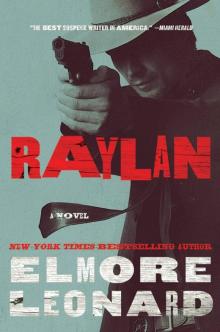 Raylan
Raylan Touch
Touch Mr Majestyk
Mr Majestyk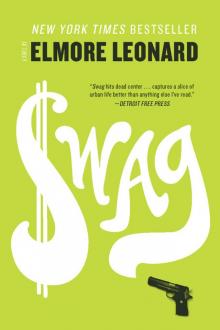 Swag
Swag Road Dogs
Road Dogs La Brava
La Brava The Hot Kid
The Hot Kid Valdez Is Coming: A Novel
Valdez Is Coming: A Novel Be Cool
Be Cool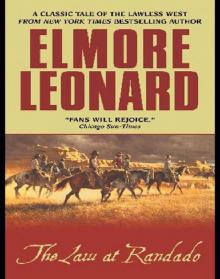 The Law at Randado
The Law at Randado The Bounty Hunters
The Bounty Hunters When the Women Come Out to Dance
When the Women Come Out to Dance 310 to Yuma and Other Stories (1953)
310 to Yuma and Other Stories (1953)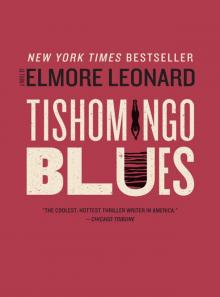 Tishomingo Blues
Tishomingo Blues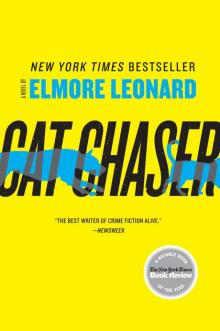 Cat Chaser
Cat Chaser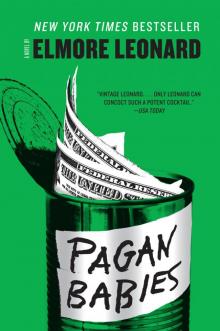 Pagan Babies
Pagan Babies Elmore Leonard's Western Roundup #1
Elmore Leonard's Western Roundup #1 52 Pickup
52 Pickup Stick
Stick The Moonshine War
The Moonshine War Valdez Is Coming
Valdez Is Coming City Primeval
City Primeval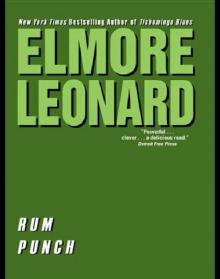 Rum Punch
Rum Punch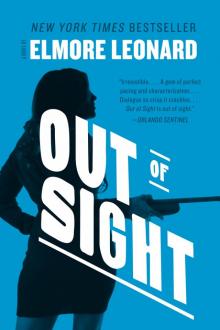 Out of Sight
Out of Sight Naked Came the Manatee (1996)
Naked Came the Manatee (1996) Killshot
Killshot Cuba Libre
Cuba Libre Forty Lashes Less One
Forty Lashes Less One The Complete Western Stories of Elmore Leonard
The Complete Western Stories of Elmore Leonard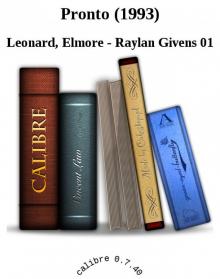 Pronto
Pronto Split Images
Split Images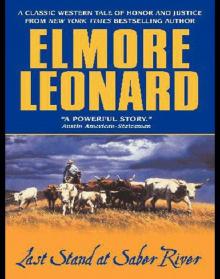 Last Stand at Saber River
Last Stand at Saber River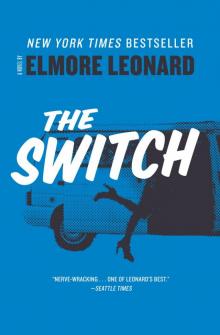 The Switch
The Switch Three-Ten to Yuma and Other Stories
Three-Ten to Yuma and Other Stories Bandits
Bandits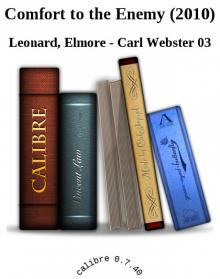 Comfort to the Enemy and Other Carl Webster Stories
Comfort to the Enemy and Other Carl Webster Stories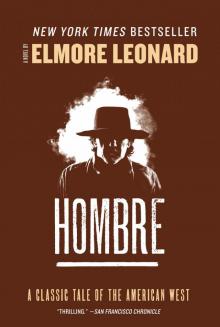 Hombre
Hombre Trail of the Apache and Other Stories
Trail of the Apache and Other Stories LaBrava
LaBrava Gold Coast
Gold Coast Jackie Brown
Jackie Brown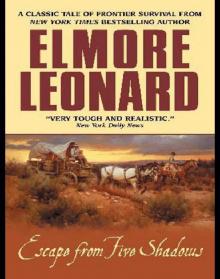 Escape From Five Shadows
Escape From Five Shadows Karen Makes out (1996)
Karen Makes out (1996)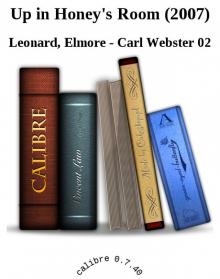 Up in Honey's Room
Up in Honey's Room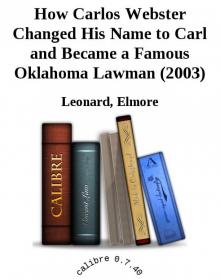 How Carlos Webster Changed His Name to Carl and Became a Famous Oklahoma Lawman (2003)
How Carlos Webster Changed His Name to Carl and Became a Famous Oklahoma Lawman (2003)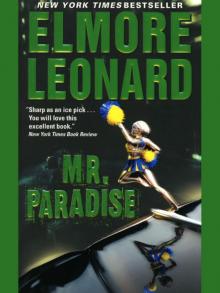 Mr. Paradise
Mr. Paradise The Hunted
The Hunted Freaky Deaky
Freaky Deaky Louly and Pretty Boy (Ss)
Louly and Pretty Boy (Ss)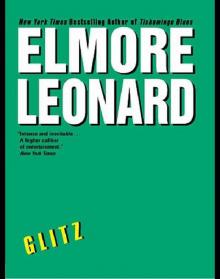 Glitz
Glitz A Coyote's in the House
A Coyote's in the House The Big Bounce jr-1
The Big Bounce jr-1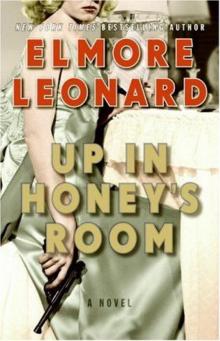 Up in Honey's Room cw-2
Up in Honey's Room cw-2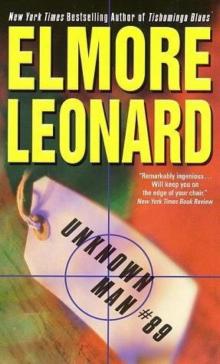 Unknown Man #89 jr-3
Unknown Man #89 jr-3 Get Shorty: A Novel cp-1
Get Shorty: A Novel cp-1 Gunsights
Gunsights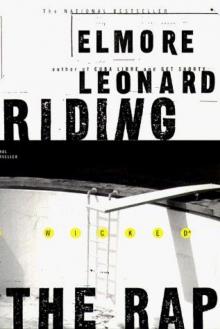 Riding the Rap rg-2
Riding the Rap rg-2